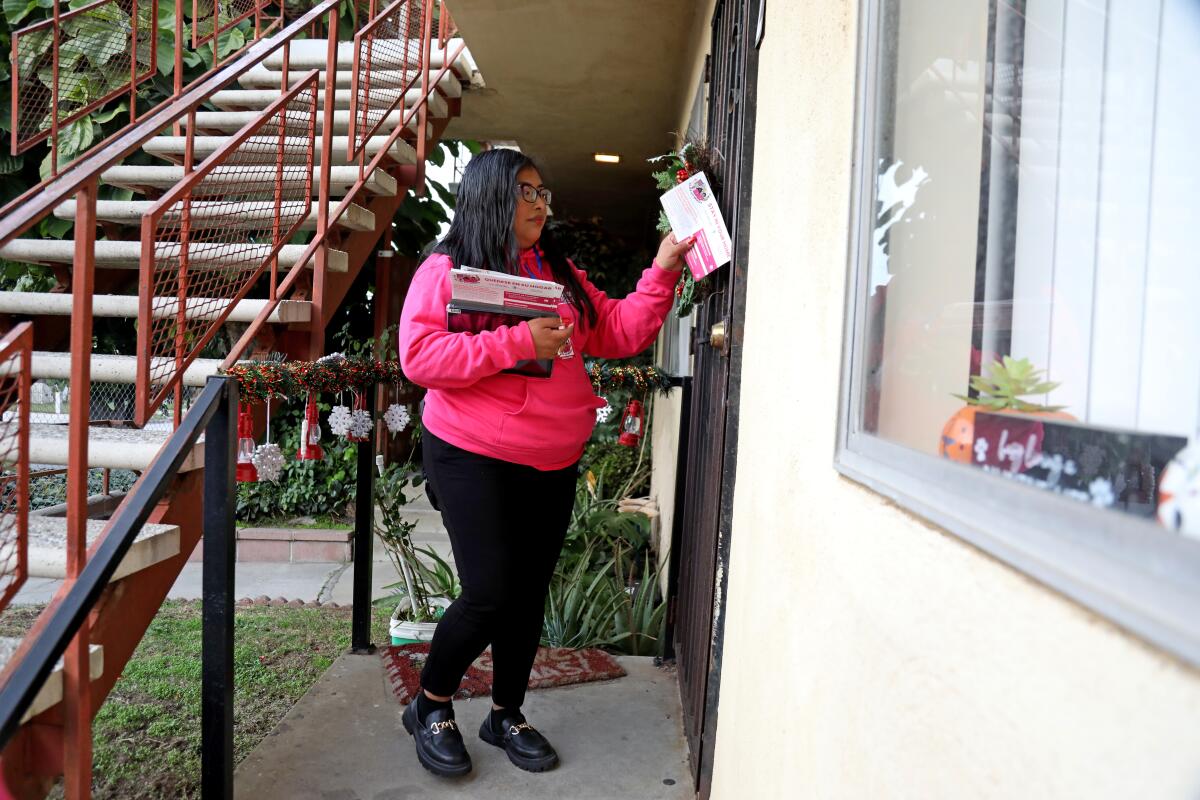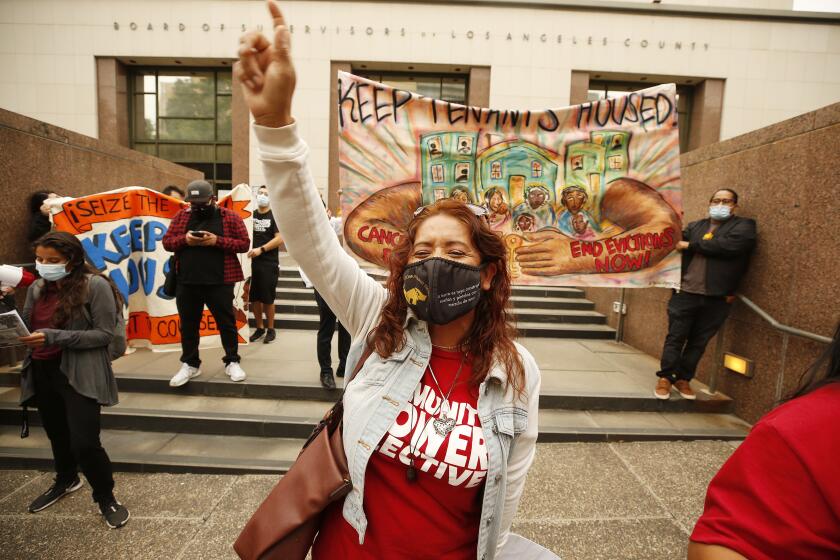At risk of eviction in L.A.? These outreach workers are looking for you

- Share via
On a cold Thursday afternoon, outreach workers Bianca Lopez and La Bomba Jackson knocked on doors at a South Los Angeles apartment complex, in search of someone at risk of losing their home.
Lopez and Jackson, who work with We Are L.A., a program of the nonprofit Mayor’s Fund for Los Angeles, were looking to help tenants avoid eviction by offering resources such as legal assistance and case management.
They were armed with a list of buildings where residents have received eviction notices in recent months — data that the housing department began collecting from landlords last year, which provides only building addresses, not the specific unit to which notices were sent.
“We don’t know the name, we don’t know who it could possibly be. We just know there were six notices sent to this address,” said Jackson, the project’s coordinator. “So we will knock on every door to try and figure out who got a notice and where we can actually help.”
Every year, tens of thousands of people in Los Angeles will face eviction in court. And with the last of the city’s pandemic-era eviction protections expiring this month, officials fear that a wave of evictions will worsen the city’s homelessness crisis. Already, court filings increased significantly after some of the protections expired last year.
Advocates and officials across the city have pursued myriad efforts to help tenants avoid that fate — including offering limited rental assistance, expanding tenant protection rules, hosting know-your-rights clinics, developing online legal tools and increasing access to pro bono lawyers.
But one of the biggest challenges they face is connecting L.A.’s struggling renters with those resources. Often tenants don’t know about the help that’s available until it’s too late. Frequently, they end up facing eviction in court, without a lawyer and struggling to navigate complex legal rules that can be difficult for even experts to understand.
“The single most important thing you can do for a person’s health is to keep them housed,” said Conway Collis, president and chief executive of the Mayor’s Fund for Los Angeles. “That’s our focus.”
With Los Angeles eviction filings back at pre-pandemic levels, one woman found herself in court, pleading for more time to avoid homelessness.
The eviction notice data are providing advocates with another tool, one that allows them to try to target their offers of legal help and education to people who have already received eviction notices.
But because the data don’t pinpoint individuals, outreach workers still end up knocking on a lot of doors, trying to find the people who need their help.
We Are L.A., whose budget for homelessness prevention work this year is $5 million, offers broad outreach at community events, tenants’ rights clinics and through a hotline and says it has reached more than 130,000 at-risk renters in all.
The targeted work — trying to find individuals who are immediately at risk of eviction and getting them help to avoid it — is more painstaking.
Last year, when the Mayor’s Fund began focusing on eviction prevention, it initially relied on data from the courts showing ZIP Codes with large numbers of eviction court filings. When outreach workers canvassed those neighborhoods, Collis said, between 8% and 9% of the people they reached needed help. Later, they were able to get census tract data from the courts, which helped narrow the search a bit more.
Now, with access to eviction notice data from the housing department, they’ve constricted the search even more. Still, the door knocking can be like looking for a needle in a haystack.
These days, about 12% of people contacted by outreach workers need their help, Collis said. Even if finding people requires intensive outreach, it’s worth it to let people know about the help that exists, he said.
For many tenants, the single biggest need is money to pay back rent, Collis said. During the pandemic, many renters racked up large amounts of rent debt. The city has a rental assistance program, but it has had problems. Available funding covers only a fraction of the need, and applications closed in October.
The L.A. City Council adopted an ordinance that protects tenants awaiting emergency rental aid from being evicted while the funds are processed.
The second-biggest need is “to let people know there are services available to help them. That’s really the biggest challenge that we have. Probably 40% of our budget for this goes to the outreach, to let people know it’s available,” Collis said.
The project employs 51 workers who do casework, outreach or both. Some are tasked with working the phones, calling addresses where tenants have received notices. Others work in the office to help tenants respond to eviction court filings. (Tenants who get a notice of eviction from the court have five days to file a response, a timeline that can be exceedingly difficult for someone unfamiliar with the law.)
When outreach workers do find someone who needs help, they connect them with a caseworker who links them to federal, state and local resources. This can include signing them up for a know-your-rights workshop or pointing them toward legal assistance. It can also include helping them access food stamps, healthcare or the earned income tax credit.
“If someone has received a notice, or a possible unlawful detainer, there’s some sort of gap within their finances,” Jackson said. “We just want to make sure that we’re filling those gaps and connecting them with services that would actually help them. If they’re spending more money on food, let’s try to see if they qualify for SNAP so now they can put that money toward rent. It’s just making sure those stopgaps are there, for them to put their money toward their bills.”
The Mayor’s Fund, which started under former Mayor Eric Garcetti to pay for civic programs, has faced criticism in the past for giving the impression that people could use their donations to curry favor in the mayor’s office.
Late last year, Mayor Karen Bass announced new ethics rules in an attempt to address those concerns, and under her, the group shifted its focus to preventing people from losing their homes, in line with the mayor’s efforts to address homelessness.
Across L.A. County, eviction cases increased by thousands as the pandemic-era moratoriums were lifted. But with other new protections, the numbers did not soar as much as some feared.
At the first address they tried late last month, Lopez and Jackson came up short. Most of their knocks went unanswered, and of the few people who answered their doors, no one said they were at risk of eviction.
They drove to a second complex, about half a mile away, where again Lopez’s knocks went largely unanswered, until they got to the last door on the second floor.
“Have you received any notices from your landlord due to nonpayment of rent or anything of that nature?” Jackson asked Laura Ayala, who had been washing dishes and trying to figure out what to make for dinner when Lopez knocked on her door. “Like a three-day, 30-day, 60-day notice?”
“Yeah,” Ayala said.
She had gotten a three-day notice a month earlier but had not yet been served with a court filing, she explained. Her case was somewhat complicated, because she relies on a housing voucher to help pay her rent. The payment had been delayed because of some issues with an inspection of the apartment, Ayala said.
Jackson asked whether she would like to register for an online tenants’ rights workshop.
“They actually let you understand your rights versus the landlords’ rights, and arm you with the information that you would need to actually handle the situation,” Jackson explained.
Ayala agreed to register and said she would definitely attend.
Even if it didn’t help in her situation, she figured someone in her life would probably need the help.
More to Read
Sign up for Essential California
The most important California stories and recommendations in your inbox every morning.
You may occasionally receive promotional content from the Los Angeles Times.














